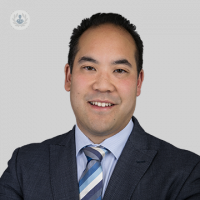Keeping down symptoms of acid reflux (literally)
Written in association with:Acid reflux occurs when the acid from your stomach rises into the oesophagus, resulting in heartburn and other possible symptoms. Highly revered consultant gastroenterologist, based in London and Ashtead, Dr Derek Chan discusses how you can best manage these symptoms, through lifestyle changes and over-the-counter medication. He also outlines when it is necessary to seek medical attention, and whether surgery is ever needed.

Are some people more prone than others to experiencing acid reflux?
There are a proportion of people who seem to be more prone to acid reflux. We know that diet and lifestyle play a role in both the symptoms and management of acid reflux. People who have, for example, a higher intake of caffeine, spicy foods, fattier foods, or acid-rich foods, tend to be more prone to symptoms of acid reflux. Also, stress can bring on acid reflux. Patients who are overweight can have more symptoms of reflux disease from additional pressure on the abdomen causing acid to go back up.
What can cause sudden bouts of acid reflux?
Acid reflux can be exacerbated by a change in diet or lifestyle. As mentioned, there are certain triggering factors for acid reflux. Some people find that if their diet has changed for a period of time, maybe over the Christmas period when they're eating more than they would normally, or if they are eating more rich or spicier foods, that can bring on bouts of acid reflux. Stressful periods can also cause more symptoms or bouts of reflux.
Is acid reflux serious? When should you see a doctor?
Acid reflux is a really common condition and many patients take over-the-counter remedies to try and help their symptoms. However, you should see a doctor if your symptoms persist despite these treatments or if it becomes something that you're relying on. If you have symptoms of regurgitation, food getting stuck, or vomiting blood, those are times when you should seek medical help immediately.
What lifestyle changes can people make if they are experiencing symptoms of acid reflux?
It is known that acid reflux can be precipitated by having foods that are high in acid or making you produce more acid. Reducing caffeinated drinks, fizzy or carbonated drinks, alcohol, and smoking can also all help with symptoms.
We also suggest, rather than eating infrequently or eating big meals, eating small meals more frequently throughout the day. This can help regulate acid and mop up the acid that we produce all the time. I'd normally recommend if you're suffering from acid reflux, try and have five or six smaller meals throughout the day.
To try and prevent symptoms overnight, it's important to eat your last meal a few hours before you actually go to bed. Lying down will mean that acid is more liable to go back up the oesophagus and cause symptoms.
Since stress also causes acid reflux, mindfulness and stress management can often help reduce the acid that is produced as well.
How is acid reflux treated?
Acid reflux is treated with diet and lifestyle modification. Often patients need to take medications, such as omeprazole or lansoprazole, which help reduce the acid in their tummy. A course of this medication would last normally between four to eight weeks and then titrating down or stopping, as symptoms improve. Some people need to take these medications longer-term if needs be, due to ongoing symptoms.
Often, we look for a bacteria called H. pylori as well because it can often exacerbate symptoms of acid reflux. If found, it can be easily eradicated with a week's course of antibiotics and medications such as omeprazole.
Some people will continue to have ongoing symptoms despite the medications or they become reliant on these medications and don't want to be. In these cases, there are options such as surgery or procedures with an endoscopy. These patient numbers aren’t huge and where possible we prefer to manage the condition through diet, lifestyle modifications, and a short course of medication. But there are certainly surgical options that can be used if needs to be.
If you are interested in booking a consultation with Dr Derek Chan, you can do so by visiting his Top Doctors profile.


